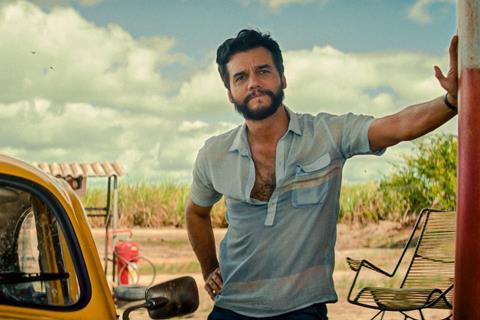The Americas region scooped the international Oscar last year with Walter Salles’ biographical drama ’I’m Still Here’. Screen assesses the titles aiming for a repeat victory.

The Americas region holds the coveted Oscar for international feature film thanks to Walter Salles’ Brazilian entry I’m Still Here, and its filmmakers return to awards season with a stirring crop of narrative and documentary contenders.
The class of 2025 reflects a perennial fascination with the region’s history of political dictatorship and human rights violations. Some in the Latin American industry bemoan the ongoing focus on “misery porn”, while others have lauded filmmakers’ desire to tackle such a rich and resonant theme.
Rest assured, politics is not the only focus, and stories from the region showcase great flights of imagination, another hallmark of Latin American storytelling. Several of this year’s regional contenders are already award winners, with a number of notable achievements in Cannes.
Brazil’s Oscar submission is Kleber Mendonca Filho’s The Secret Agent starring Wagner Moura (see page 22). The languid 1970s-set thriller, about a left-leaning academic who upsets powerful people and flees to his birthplace in Recife, premiered in Cannes Competition, where it won the best director and actor prizes. Neon snapped up North American rights and is giving The Secret Agent a strong awards push.
This is the third time Filho has represented Brazil after Neighbouring Sounds in 2014 and Pictures Of Ghosts in 2024, while arguably his best-known narrative features outside his home country — Aquarius and Bacurau — were not selected by Brazil for the Oscars.
I’m Still Here enjoyed a late burst of momentum last season, and besides the Oscar there was also a lead actress nomination for Fernanda Torres. Neon will be looking to earn similar plaudits for Moura, whose credits include Narcos and Elite Squad.
Prior to Brazil, Argentina was the last country from the region to earn an Oscar nomination, doing so in 2023 with Santiago Mitre’s Argentina, 1985. Its 52nd submission is Belén by Dolores Fonzi, a San Sebastian world premiere based on Ana Correa’s non-fiction book. It follows a woman who became a cause célèbre when she was imprisoned in 2014 after a miscarriage and falsely accused of inducing an abortion. She was exonerated two years later and Argentina legalised abortion in 2020.
The Argentinian industry is looking to garner its seventh nomination. Fonzi’s second feature, after 2023 comedy drama Blondi, drew 100,000 admissions in its home country and launched in the US on Prime Video on November 14. Fonzi also stars as real-life crusading lawyer Soledad Deza, opposite Camila Plaate as her client — given the alias Belén.
Chile arrives with a short, albeit relatively impactful, track record. After Pablo Larrain’s No garnered the country’s first nomination in 2013, it was only another five years before Sebastian Lelio won the Oscar in 2018 with A Fantastic Woman.
Now hopes are high for the current Chilean contender, Diego Cespedes’ The Mysterious Gaze Of The Flamingo, after it won Un Certain Regard’s top prize this year in Cannes. The 1980s-set drama takes place as an unknown illness said to be transmitted through a man’s loving gaze ravages a mining town. Altered Innocence is the North American distributor.
The Colombian contingent is feeling cautiously confident about Simon Mesa Soto’s A Poet, another acclaimed selection from Un Certain Regard having walked off with the jury prize. First-time actor Ubeimar Rios stars in this darkly comic tale of a drunken failed writer wandering the streets of Medellin, who grabs a shot at redemption when he mentors a young student.
Could this be the year Colombia earns its second nomination in 33 attempts, after Ciro Guerra’s Embrace Of The Serpent in 2016? Having the support of 1-2 Special, the ambitious new US arthouse distributor founded by former Sideshow executive Jason Hellerstein, will not hurt as the company looks to make some noise. This is Soto’s second feature after Cannes 2021 Critics’ Week selection Amparo.
Iran-born director Alireza Khatami’s Turkish-language The Things You Kill becomes the latest in a line of storied films and filmmakers to fly the flag for Canada. Telefilm Canada picked the thriller — a Sundance World Cinema Dramatic best director prize winner — from a pool of 16 titles. It follows an enigmatic gardener who helps a university professor seek revenge after his mother’s suspicious death.
Canadian films have figured prominently in this category, earning seven nominations, most recently in 2013 for Kim Nguyen’s War Witch. Matthew Rankin’s Universal Language reached the Oscar shortlist of 15 last season. However, only one feature has won: Denys Arcand’s The Barbarian Invasions in 2004. Cineverse holds US rights to The Things You Kill, and the cast includes Ekin Koc, Erkan Kolcak Kostendil, Hazar Erguclu and Ercan Kesal.
Power play

A cinematic powerhouse in the Americas region, Mexico this year has submitted Pierre Saint-Martin’s feature debut We Shall Not Be Moved. Winner of the best feature award at Guadalajara International Film Festival, the satirical dark comedy centres on a lawyer trying to identify the soldiers behind her brother’s murder in the 1968 Tlatelolco massacre of students. Cinema Tropical has acquired US rights.
Mexico won the Oscar in 2019 with Alfonso Cuaron’s Roma, its sole win to date from nine nominations. It was the last year the category was named best foreign-language film, after pointed remarks by Cuaron from the podium, who cited as early inspirations “foreign-language films” such as Citizen Kane, Jaws and The Godfather.
Nelson Carlo De Los Santos Arias’ Pepe earned admirers when it debuted at the 2024 Berlinale and won the director Silver Bear. As the submission for Dominican Republic, the docudrama uses traditional oral history to tell its story from the point of view of the only hippopotamus ever to be killed in the Americas. The director’s second feature, after 2017 Locarno and Mar Del Plata prize winner Cocote, is the country’s 18th submission.
Like Dominican Republic, Costa Rica has yet to receive a nomination from its 13 previous submissions. The Altar Boy, The Priest And The Gardener from Juan Manuel Fernandez is a documentary about two men seeking justice after they were sexually abused as children by a priest.
Daniel Yegres’s Venezuelan submission Alí Primera — about the musician whose songs condemned 2017 government oppression and became part of a public resistance movement — has attracted the support of recent Nobel Peace Prize winner Maria Corina Machado. It is the country’s 35th submission.
Uruguay has selected Don’t You Let Me Go from Ana Guevara and Leticia Jorge. The duo’s third feature is a time-travel tale about a woman who goes back to when her friend was still alive. From Peru comes Marco Panatonic’s Motherland, the 2023 Mar Del Plata best film winner about a young man from the mountains who is torn when he leaves to study engineering in Cusco. Peru’s sole nomination remains Claudia Llosa’s The Milk Of Sorrow in 2010. Paraguay has backed Juanjo Pereira’s doc Under The Flags, The Sun, which examines the fall of Alfredo Stroessner’s 35-year dictatorship in 1989.
Ecuador continues its search for a first berth on the shortlist of 15, let alone a nomination, with Diego Ortuño’s Chuzalongo. The folk horror is about an Andean creature that appears childlike before transforming into a blood-sucking monster. The feature was one of the biggest hits at Ecuador’s box office in 2024.
Panama is also after its first nod, although Abner Benaim’s Plaza Catedral reached the Oscar shortlist in 2022. Hopes this season lie with documentarian Ana Endara’s narrative feature debut Beloved Tropic, which premiered at the 2024 Toronto International Film Festival and explores the connection between two lonely women. Chilean superstar Paulina Garcia stars with Jenny Navarrete.
Bruno Mourral’s Kidnapping Inc., the submission from Haiti, premiered at Sundance 2024 before going on to win a couple of prizes at Fantasia. It tells the tale of two hapless criminals tasked with transporting the kidnapped son of a presidential candidate.
The Southern House from debutantes Carina Oroza and Ramiro Fierro is Bolivia’s 18th submission and takes place during the last dictatorship, as a woman returns to her home 30 years after being held captive there by soldiers.

























No comments yet